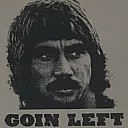Mick Lawrence on navigating rogue waves
Time was that Australian mainlanders ridiculed Tasmania as being a land that time forgot - the inhabitants a bit backwards, a bit slow on the uptake.
Now, however, mainlanders view Tassie as an oasis in a frantic world and they’re flocking south in great numbers; the new arrivals threatening to recreate what they’re escaping. Filmmaker Mick Lawrence is acutely aware of how things are changing as he’s spent a large chunk of his life in the Tassie wilderness. After all, he pioneered many of the state’s best waves.
Awareness is one thing, appreciation is yet another, and one of the observations Mick makes in his multi-dimensional documentary, Rogue Waves, is that wilderness, for some people at least, is necessary. It’s a salve for an unsettling world.

Despite the title, Rogue Waves isn’t just a surf movie. Sure, there’s period footage of early Tasmanian surfers, and many of the state’s waves looking resplendent, but it’s what journalist’s dryly call a ‘human-interest story’. The title is central to a theory Mick developed in the wake of several profound hardships and how he coped with said upheavals.
The film is at once a love poem for his departed son and also the wilderness that provided solace during his dark days battling sorrow and the Black Dog. The human-interest story is his own; the filmmaker has dared to become the subject, turn the camera on himself, document those times when he was upended by the eponymous rogue waves.
"At times it was brutal," Mick said about the film. "I almost walked away several times, it was all too hard. Did I really want to expose this sort of thing? My mental health, my dad's suicide?"
Mick narrates the film, at first merely describing his life, then later shifting into a mode of inquiry, his broad Aussie accent, so low and resonant, bumping up against questions of loss and meaning. The kind you find tackled by Eastern yogis sitting on a hilltop, but now brought to bear by an ordinary bloke named Mick.

Chance played a part, both in Mick’s life as he tells it, but also in getting the film to where it is. Allow me to explain.
Ten years ago, during a period of ill health, Mick wrote a book called ‘Surfing On The Inside’ that detailed his early surfing life. In 2016, he had a chance encounter deep in the Tassie wilderness with a mainlander who read that book and asked when the film was getting made - something Mick hadn’t yet considered.
A year later, Mick’s son Tim died. The grieving father was hit by the biggest rogue wave of his life, and like Tom Blake who took a lifetime to formulate his theory of Nature = God, Mick’s story about hardship and wilderness, but also coloured with mateship and love, began to congeal, so he documented it in the only way he knew how.
Rogue Waves was a film for Tasmanians, and it played at the State Theatre in Hobart. After Swellnet ran an article about the film last year, Mick received a call from an elder surfer with a voice low and resonant, only the accent was mixed - part Hawaiian, part Australian. The caller introduced himself as Jack.
It took thirty minutes for Mick to realise he was talking to Jack McCoy, who, after seeing the film and loving it (“It’s a beautiful film, a heartfelt film”), helped get the film a deal with an independent distributor in the US.
Rogue Waves is now available for everyone to view on Amazon Prime, and it's also available to buy or rent - just $3.00! - on Vimeo on Demand.
In an age of clips and two minute edits, the art of storytelling has gone missing in surf filmmaking, yet Rogue Waves shows it hasn't been lost.


Comments
Great weekend to watch it. Chaos at the supermarket this morning.
Awesome, can watch it on the big tele.
Looking forward to it.
really looking forwards to checking it out.
Watched it last night on tele -inspiring. Shows the power of nature and community to heal.
Well worth the $3. Speaks with such graciousness given some of the cards life’s dealt him.